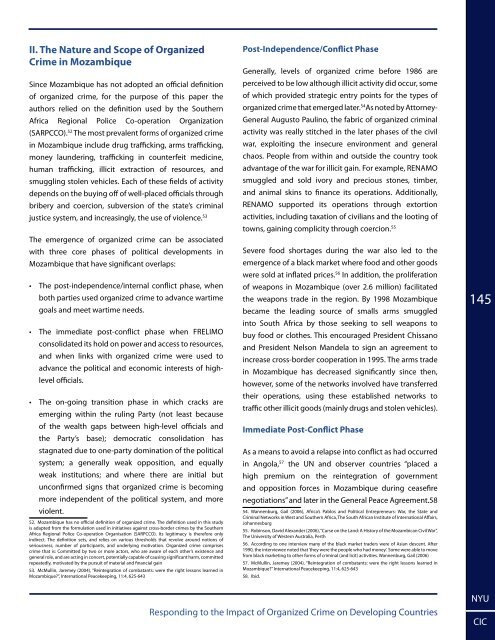here - Center on International Cooperation - New York University
here - Center on International Cooperation - New York University
here - Center on International Cooperation - New York University
Create successful ePaper yourself
Turn your PDF publications into a flip-book with our unique Google optimized e-Paper software.
II. The Nature and Scope of Organized<br />
Crime in Mozambique<br />
Since Mozambique has not adopted an official definiti<strong>on</strong><br />
of organized crime, for the purpose of this paper the<br />
authors relied <strong>on</strong> the definiti<strong>on</strong> used by the Southern<br />
Africa Regi<strong>on</strong>al Police Co-operati<strong>on</strong> Organizati<strong>on</strong><br />
(SARPCCO). 52 The most prevalent forms of organized crime<br />
in Mozambique include drug trafficking, arms trafficking,<br />
m<strong>on</strong>ey laundering, trafficking in counterfeit medicine,<br />
human trafficking, illicit extracti<strong>on</strong> of resources, and<br />
smuggling stolen vehicles. Each of these fields of activity<br />
depends <strong>on</strong> the buying off of well-placed officials through<br />
bribery and coerci<strong>on</strong>, subversi<strong>on</strong> of the state’s criminal<br />
justice system, and increasingly, the use of violence. 53<br />
The emergence of organized crime can be associated<br />
with three core phases of political developments in<br />
Mozambique that have significant overlaps:<br />
• The post-independence/internal c<strong>on</strong>flict phase, when<br />
both parties used organized crime to advance wartime<br />
goals and meet wartime needs.<br />
• The immediate post-c<strong>on</strong>flict phase when FRELIMO<br />
c<strong>on</strong>solidated its hold <strong>on</strong> power and access to resources,<br />
and when links with organized crime were used to<br />
advance the political and ec<strong>on</strong>omic interests of highlevel<br />
officials.<br />
• The <strong>on</strong>-going transiti<strong>on</strong> phase in which cracks are<br />
emerging within the ruling Party (not least because<br />
of the wealth gaps between high-level officials and<br />
the Party’s base); democratic c<strong>on</strong>solidati<strong>on</strong> has<br />
stagnated due to <strong>on</strong>e-party dominati<strong>on</strong> of the political<br />
system; a generally weak oppositi<strong>on</strong>, and equally<br />
weak instituti<strong>on</strong>s; and w<str<strong>on</strong>g>here</str<strong>on</strong>g> t<str<strong>on</strong>g>here</str<strong>on</strong>g> are initial but<br />
unc<strong>on</strong>firmed signs that organized crime is becoming<br />
more independent of the political system, and more<br />
violent.<br />
52. Mozambique has no official definiti<strong>on</strong> of organized crime. The definiti<strong>on</strong> used in this study<br />
is adapted from the formulati<strong>on</strong> used in initiatives against cross-border crimes by the Southern<br />
Africa Regi<strong>on</strong>al Police Co-operati<strong>on</strong> Organisati<strong>on</strong> (SARPCCO). Its legitimacy is t<str<strong>on</strong>g>here</str<strong>on</strong>g>fore <strong>on</strong>ly<br />
indirect. The definiti<strong>on</strong> sets, and relies <strong>on</strong> various thresholds that revolve around noti<strong>on</strong>s of<br />
seriousness, number of participants, and underlying motivati<strong>on</strong>. Organized crime comprises<br />
crime that is: Committed by two or more actors, who are aware of each other’s existence and<br />
general role, and are acting in c<strong>on</strong>cert, potentially capable of causing significant harm, committed<br />
repeatedly, motivated by the pursuit of material and financial gain<br />
53. McMullin, Jaremey (2004), “Reintegrati<strong>on</strong> of combatants: were the right less<strong>on</strong>s learned in<br />
Mozambique?”, Internati<strong>on</strong>al Peacekeeping, 11:4, 625-643<br />
Post-Independence/C<strong>on</strong>flict Phase<br />
Generally, levels of organized crime before 1986 are<br />
perceived to be low although illicit activity did occur, some<br />
of which provided strategic entry points for the types of<br />
organized crime that emerged later. 54 As noted by Attorney-<br />
General Augusto Paulino, the fabric of organized criminal<br />
activity was really stitched in the later phases of the civil<br />
war, exploiting the insecure envir<strong>on</strong>ment and general<br />
chaos. People from within and outside the country took<br />
advantage of the war for illicit gain. For example, RENAMO<br />
smuggled and sold ivory and precious st<strong>on</strong>es, timber,<br />
and animal skins to finance its operati<strong>on</strong>s. Additi<strong>on</strong>ally,<br />
RENAMO supported its operati<strong>on</strong>s through extorti<strong>on</strong><br />
activities, including taxati<strong>on</strong> of civilians and the looting of<br />
towns, gaining complicity through coerci<strong>on</strong>. 55<br />
Severe food shortages during the war also led to the<br />
emergence of a black market w<str<strong>on</strong>g>here</str<strong>on</strong>g> food and other goods<br />
were sold at inflated prices. 56 In additi<strong>on</strong>, the proliferati<strong>on</strong><br />
of weap<strong>on</strong>s in Mozambique (over 2.6 milli<strong>on</strong>) facilitated<br />
the weap<strong>on</strong>s trade in the regi<strong>on</strong>. By 1998 Mozambique<br />
became the leading source of smalls arms smuggled<br />
into South Africa by those seeking to sell weap<strong>on</strong>s to<br />
buy food or clothes. This encouraged President Chissano<br />
and President Nels<strong>on</strong> Mandela to sign an agreement to<br />
increase cross-border cooperati<strong>on</strong> in 1995. The arms trade<br />
in Mozambique has decreased significantly since then,<br />
however, some of the networks involved have transferred<br />
their operati<strong>on</strong>s, using these established networks to<br />
traffic other illicit goods (mainly drugs and stolen vehicles).<br />
Immediate Post-C<strong>on</strong>flict Phase<br />
As a means to avoid a relapse into c<strong>on</strong>flict as had occurred<br />
in Angola, 57 the UN and observer countries “placed a<br />
high premium <strong>on</strong> the reintegrati<strong>on</strong> of government<br />
and oppositi<strong>on</strong> forces in Mozambique during ceasefire<br />
negotiati<strong>on</strong>s” and later in the General Peace Agreement.58<br />
54. Wannenburg, Gail (2006), Africa’s Pablos and Political Entrepreneurs: War, the State and<br />
Criminal Networks in West and Southern Africa, The South African Institute of Internati<strong>on</strong>al Affairs,<br />
Johannesburg<br />
55. Robins<strong>on</strong>, David Alexander (2006), “Curse <strong>on</strong> the Land: A History of the Mozambican Civil War”,<br />
The <strong>University</strong> of Western Australia, Perth<br />
56. According to <strong>on</strong>e interview many of the black market traders were of Asian descent. After<br />
1990, the interviewee noted that ‘they were the people who had m<strong>on</strong>ey’. Some were able to move<br />
from black marketing to other forms of criminal (and licit) activities. Wannenburg, Gail (2006)<br />
57. McMullin, Jaremey (2004), “Reintegrati<strong>on</strong> of combatants: were the right less<strong>on</strong>s learned in<br />
Mozambique?” Internati<strong>on</strong>al Peacekeeping, 11:4, 625-643<br />
58. Ibid.<br />
145<br />
Resp<strong>on</strong>ding to the Impact of Organized Crime <strong>on</strong> Developing Countries<br />
NYU<br />
CIC
















